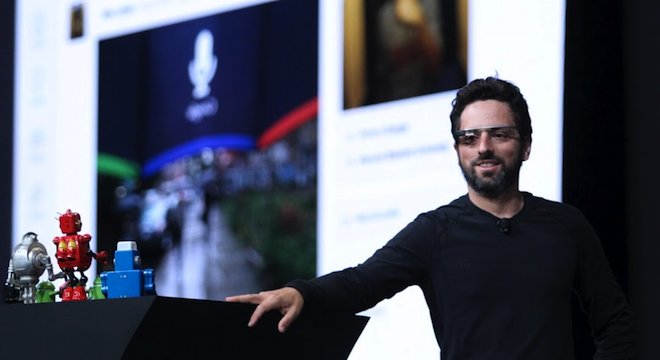The time for Google Glass, the search giant’s new computerized glasses, is nearly upon us.
After skydivers broadcast their fall through Google Glass prototypes at a show-stealing demo during Google’s 2012 summer developer conference, Google began taking pre-orders to be shipped out in early 2013.
Called “Google Glass: Explorer Edition,” the version of the hi-tech specs Google has promised to ship each cost a whopping $1,500 per pair, orders of which were restricted to those lucky attendees of the conference.
Google hasn’t publicly stated how many pre-orders of Google Glass it accepted, declining to specify when asked by TPM for this story. But we know at least upwards of 1,000 developers placed pre-orders, based on the numbering scheme Google has employed by sending out novelty blocks of engraved pieces of glass as confirmation for those who took the opportunity to pre-order.
Aside from the blocks of glass, those who pre-ordered have received precious little from Google in the way of specific information about a shipment date, but for a message from Google co-founder and Glass evangelist Sergey Brin. Google executives have revealed a bit more about what Glass may be capable of in online interviews, such as layering views of digital information over the real world and taking first-person photos and video.
But that hasn’t stopped developers from speculating about the capabilities the new wearable computers will offer.
TPM spoke to several developers who confirmed their pre-orders with us, and they offered the following projections and thoughts about Google’s most experimental real hardware offering yet.
David Shellabarger, freelance Android Apps Developer, Nightshade Labs
“Personally I’m quite excited about Google Glass,” Shellabarger told TPM. “Since I’m an Android developer I am most looking forward to interfacing the glasses with Android apps.”
Currently, Shellabarger, based out of Chattanooga, Tenn., is working on “daily deal apps for Barclay Card,” he told TPM.
But when it comes to Google Glass’s potential, Shallabarger sees sports and games as obvious use cases. As he told TPM:
“I’m particularly thinking about augmented reality with geo data sets like the one I am building in my next app. It’s a disc golf (frisbee golf) app and I’m hoping that Google Glass will easily allow me to overlay hole/basket locations in real time for wearers and have basic input to keep track of score without ever taking your phone out of your pocket.”
However, when it comes to mass adoption, Shellabarger is more tentative.
“As for widespread adoption of the technology, I’m very skeptical at the moment,” Shellabarger said. “I don’t think it will be adopted nearly as fast as smartphones.”
Det Ansinn, President at BrickSimple
“We’re excited, we’re waiting with bated breath,” Ansinn told TPM about Google Glass, on behalf of his 25 person team at BrickSimple, an app development firm based primarily out of Doylestown, Penn. “This is about the next step on the paradigm.”
Specifically, Ansinn said he believes Google Glass will be the next logical phase in the smartphone revolution.
“It’s about making technology even more intimate and integrated when you go about your day,” Ansinn said.
Ansinn also noted that Google had been “very careful in rolling out expectations for this technology,” specifically limiting pre-orders to apps developers and organizations that are adept at working with unfinished technology and providing constructive feedback to improve it.
“This Explorer Edition is about developers being able to explore the tech,” Ansinn clarified.
But that doesn’t mean his team doesn’t have some ideas in mind for apps. Quite the contrary. As Ansinn told TPM:
“At this early stage of brainstorming, we’re thinking about areas where it’s very important for a person to have an app with them. We work with one company on a management and repair app, and we currently do that with a tablet. For Glass, it’s an obvious app: If you’re looking to repair something, you want to have that information right there available to user. It’s even more useful having it right there in their eyes. We also see potential applications on the law enforcement side. What direction we go in depends on how the device we have in the hand operates.”
Pressed further about potential law enforcement uses, Ansinn said that the idea would be to provide information about outstanding warrants immediately through Google Glass to officers pulling someone over for a traffic offense, for example.
Correction: This article originally incorrectly spelled the word “bated” as “baited” in a quote by Mr. Ansinn. We have since corrected the reference in copy and regret it.






